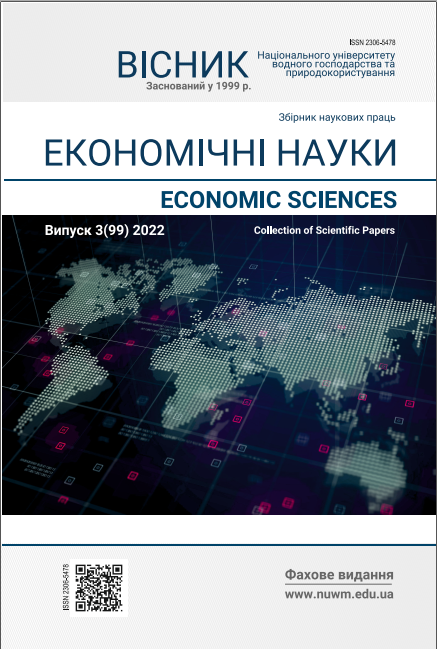SOCIAL DIALOGUE AS A TOOL FOR ENSURING SOCIAL JUSTICE IN THE DISTRIBUTION OF INCOME
DOI:
https://doi.org/10.31713/ve3202215Keywords:
social justice, social partners, social dialogue, contractual regulation, collective agreements and contracts, income distribution.Abstract
Against the background of significant economic and social upheavals inherent in Ukrainian society in recent years, there is an aggravation of the problem of fair factor distribution of income, which is manifested in the growth of arrears from the payment of wages and the growth of the poverty level of the working population. In order to achieve social justice through the observance of basic human rights and freedoms guaranteed by the state, and ensuring the fair distribution of economic and social assets of society beyond those provided by the state, it is necessary to comprehensively use the tools of the state and contractual regulation, including social dialogue.The results of the ILO study, reflected in the report Social Dialogue and Economic Performance, showed that social dialogue contributed to economicstability, prosperity, and long-term business success in developed countries in northern Europe.The most essential form of SD is collective negotiations between social partners, which usually end with the signing of a collective agreement or the conclusion of a collective agreement. At the same time, the legally fixed expansion of the range of issues related to income distribution, which are included in the scope of regulation of collective agreements and contracts, will contribute to reducing the tension in SLR. In order to increase cooperation between employers, trade unions and relevant government agencies in ensuring tripartite dialogue, the latest digital tools should be used to facilitate their communication, including the creation of an online communication network through a web platform accessible to all social partners.Therefore, effective social dialogue can become an effective tool for preventing the occurrence of conflicts and achieving social justice in distributive relations and will contribute to the establishment of productive communication interaction between social partners.References
ILO. Declaration on Social Justice for a Fair Globalization. 2008. URL: http://www.ilo.org/global/about-the-ilo/mission-and-objectives/WCMS_099766/lang-en/index.htm (дата звернення: 12.07.2022).
Міщук Г. Ю., Самолюк Н. М. Вимірювання соціальної справедливості у контексті оцінки ефективності відносин розподілу в суспільстві. Демографія та соціальна економіка. 2018. № 1 (32). С. 58–72.
Grimshaw D., Koukiadaki A., Tavora I. Social Dialogue and Economic Performance. What matters for business. A review. ILO. Brussel. 2017. URL: https://www.ilo.org/wcmsp5/groups/public/---ed_protect/---protrav/---travail/documents/publication /wcms_571914.pdf. (дата звернення: 12.07.2022).
Vigeo E. Social Dialogue: a corporate social responsibility ‘blind spot’. Sustainability Focus. 2018. 12/06. URL: http://www.vigeo-eiris.com/wpcontent/uploads/2018/06/20180612_SF_Dialogue-Social-.pdf?x62552. (дата звернення: 12.07.2022).
Achieving Decent Work and inclusive growth : the business case for social dialogue. URL: http:// https://www.theglobaldeal.com/resources/Thematic-Brief-Achieving-Decent-Workand-Inclusive-Growth_The-Business-Case-for-Social-Dialogue.pdf (дата звернення: 12.07.2022).
ILO. Social Dialogue Report 2022: Collective bargaining for an inclusive, sustainable and resilient recovery. 2022. URL: https://www.ilo.org/global/publications/books/WCMS_842807/lang--en/index.htm (дата звернення: 20.07.2022).
National tripartite social dialogue: an ILO guide for improved governance. Geneva: ILO, 2013. 282 р. URL: https://www.ilo.org/wcmsp5/groups/public/---ed_dialogue/---
dialogue/documents/publication/wcms_231193.pdf (дата звернення: 22.07.2022).
Про соціальний діалог в Україні : Закон України від 23.12.2010 р. № 2862-17. URL: http://zakon2.rada.gov.ua/laws/show/2862-17 (дата звернення: 22.07.2022).
Walton R. E., McKersie R. B. A Behavioral Theory of Labor Negotiations. New York : McGraw-Hill, 1965.
The need for social dialogue in addressing the COVID-19 crisis. Briefing note. ILO. 2020. URL: https://www.ilo.org/global/about-the-ilo/how-the-iloworks/departments-andoffices/governance/WCMS_743640/lang--en/index.htm (дата звернення: 15.06.2020).
Grimshaw D., Hayter S. Employment Relations and Economic Performance. Comparative Employment Relations in the Global Economy. 2nd ed., edited by Carola Frege and John Kelly. London : Routledge, 2020. 139–168.
ТСН. Названо кількість українців, які працюють, але живуть у бідності. URL: https://tsn.ua/groshi/nazvano-kilkist-ukrayinciv-yaki-pracyuyut-ale-zhivut-ubidnosti-1760974.html (дата звернення: 20.07.2022).
Самолюк Н. М. Механізм регулювання розподілу доходів суб’єктів господарювання: теоретичний аспект. Вісник ХНУ. Економічні науки. 2016. № 3. Том 2. С. 270–275.
Про колективні договори і угоди : Закон України від 01.07.1993 р. № 3356-XII. URL: https://zakon.rada.gov.ua/laws/show/3356-12 (дата звернення: 22.07.2022).
Samoliuk N., Sochacka M. Prospects for digitization of social dialogue to ensure the effectiveness of communications in the social and labour sphere. International Scientific Conference Economics, Management, Finance and Social Attributtes of Economic System (EMFSA 2022), Pula (July, 7–10, 2022). Р. 53. URL: https://www.csrpub.eu/files/Proceedings%20of%20abstract-EMFSA-2022.pdf (дата звернення: 10.08.2022).

